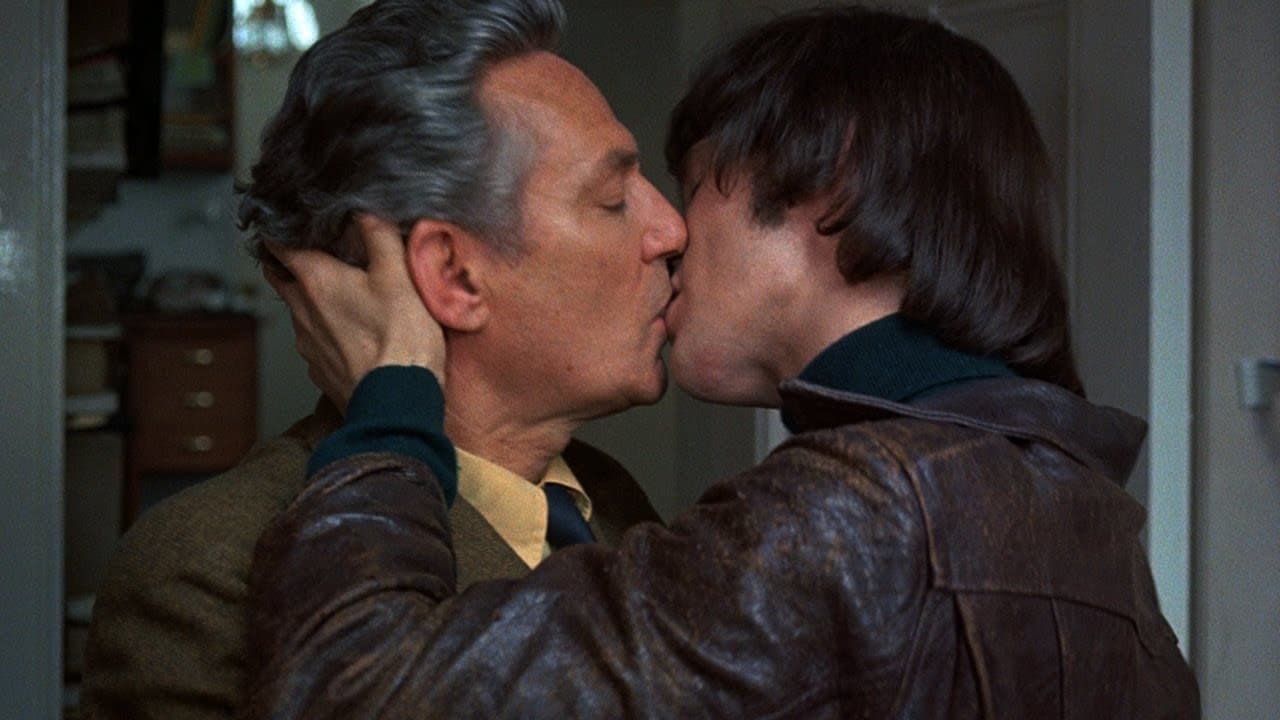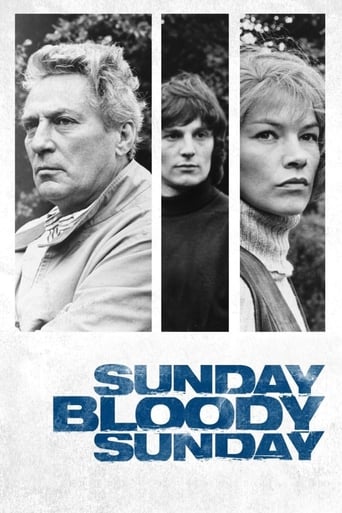

Disappointment for a huge fan!
... View MoreI cannot think of one single thing that I would change about this film. The acting is incomparable, the directing deft, and the writing poignantly brilliant.
... View MoreIt's the kind of movie you'll want to see a second time with someone who hasn't seen it yet, to remember what it was like to watch it for the first time.
... View MoreIt is interesting even when nothing much happens, which is for most of its 3-hour running time. Read full review
... View MorePeter Finch and Glenda Jackson play two lonely souls who are willing to share the same young man if it means staving off loneliness in this refreshingly adult relationship drama from John Schlesinger.For a film made in the early 1970s, "Sunday Bloody Sunday" is surprisingly frank in its treatment of homosexuality, and it has a sort of hollowed out vibe that matches the social unrest that was clearly impacting Britain as much as America in 1971. Characters act primarily out of either desperation or boredom, as if seeking for actual happiness is a pointless exercise. The movie is a tad slow and a bit talky, but it is very good and gives two accomplished English actors a chance to shine.Both Jackson and Finch were nominated for Oscars for their performances in this film, both deservedly, Finch especially so. His role is the less showy and therefore probably the more difficult, and Finch plays it perfectly. Jackson is good, but there's just something about her manner that always annoys me no matter what character she's playing, so it's tough for me to be subjective about her, though there's no denying her talent. Schlesinger was also nominated for Best Director, as was Penelope Gilliatt, a former movie critic, for her original screenplay. Oddly, the film itself, though nominated for the formidable combination of Director, Actor, Actress and Original Screenplay did not manage to snag a Best Picture nom from the Academy, and it struck out in all its nominated categories.This is one to definitely check out.Grade: A
... View MoreWhat amazes me the most is the portrait of all the characters. So natural, so... real (so uncomfortable, isn't?). In this motion picture, sir, everybody is civilized. There are no clichés or fake morality. Alex (Glenda) and Daniel (Peter) are devastaded inside, but they keep on moving... Divorce doesn't mean that your companion and all the memories of his/her died. And this movie shows it. Shows also that Bob (Murray), the lover in common, doesn't know how to love... he does it like 80% of the people in this world (young people mainly): childishly, one- dimensionally, conducted by his genital. This movie is for grown-ups. Mentally speaking, of course. The maturity of Glenda and Peter contrasted by the naive handsome looks of Murray was what Schlesinger gave us. Pay attention to it. Pay attention to the title. Glenda, Peter and Schlesinger are/were all geniuses. By the way, I am a 22 year old Brazilian who identifies a lot with Schlesinger work, specially "Midnight Cowboy".
... View MoreI am a big fan of John Schlesinger because he dares to go places no one has gone before, but, alas, it is quite obvious that he was a pervert at heart because his most memorable films have been studies in modern perversion. Midnight Cowboy, Darling and now Sunday, Bloody, Sunday - all with perverted story lines that would make poor Walt Disney turn in his grave. In the biography about Schlesinger, we are told that the director and the writer, Penelope Gilliatt, despised one another and in fact Schlesinger ended up calling the writer "a c---!" Heavens to Betsy! Surely Schlesinger knew what he was getting into when he was dealing with a movie critic who happened to write a script he wanted to make into a film. She despised the changes he made, could not abide by the fact additional writers were brought in - poor thing - you would think after all those movie reviews she wrote she would know what happens to a script in movie-land. Sorry to say, apparently she did not. Of course no one seemed concerned with the very obvious conflict of interest involved with an individual who just happened to be a major movie critic and now was the author of a movie script. It's almost axiomatic that the fur would fly on this one and apparently it did. It really does not show in the film which is from a script point of view well paced and well written, but the storyline is so depraved that slowly it dawns on the viewer just what he had been taken down the road for and eventually the viewer sits there thinking, "My God! What have I done?" But then that's Hollywood because the very nature of a script is to manipulate the viewer into a point of view he has never had before. And this is the magic of the movies.
... View MoreEven with The Code now a thing of the past it took the United Kingdom and a respected director from there to craft a film showing two men in a passionate kiss. When Peter Finch and Murray Head kissed like they meant it, it was untold generations of gay men felt like society was finally recognizing them. That Sunday Bloody Sunday came out two years after the Stonewall Riots was no accident. Probably before Stonewall, John Schlesinger might have had problems getting his film released on this side of the pond. And that's even after Midnight Cowboy.Murray Head plays a shallow bisexual young artist who has a simultaneous relationship going with both Peter Finch and Glenda Jackson. Jackson is a thirty something career woman who can't find any great satisfaction in relationships beyond sex. That Murray Head supplies well and in abundance apparently, so much so that he can also service Peter Finch as well.Jackson should have listened to mom's advice. Peggy Ashcroft who plays Jackson's mother says quite right that you never get 100%, so you get the best you can and make it work. Apparently this is something that Glenda can't or won't grasp.For Peter Finch as the very closeted gay male the pressures are far worse. He's Jewish and he's a doctor and apparently it's true in both British and American Jewish scenes that if you're a doctor you'll have Jewish women throwing themselves at you and Jewish mothers ready to sacrifice all for a doctor as a son-in-law. And the idea of a forty something unmarried doctor who might be gay is just beyond all realm of possibility. Such a thing would be a SHANDA.Peter Finch strikes a universal note in all gay males in any culture. Before the closet doors were open, Dr. Daniel Hirsch's story was played out a gazillion times all over the world. Thank the Deity we have reached a point where Daniel Hirsch's life path is not the only one open to us.Sunday Bloody Sunday has no real plot, it's a character study of two people and their intertwining relationships because of a third party. There's no real plot here, but the characterizations are as deep as they can get. Sunday Bloody Sunday earned Oscar nominations for Peter Finch and Glenda Jackson as Best Actor and Actress, John Schlesinger for Best Director and Penelope Gilliatt as well for Best Original Screenplay. All that and no nomination for Best Picture?I do kind of wonder where Murray Head's character is right now. Since this came out in 1971 Head was playing someone 25 which was his age at the time. He partied through the seventies, did he settle down with someone of either gender, did indiscriminate sex bring him in contact with AIDS in the eighties and nineties? Is he looking now for some young Murray Heads in his sixties? Was he really transgender and if so has he had the reassignment surgery or not? You can read all of that into his portrayal of a vacuous party boy. In a way Sunday Bloody Sunday is about the tragedy of bisexuals in this society. They can't settle down to a monogamous relationship because they have sexual needs on both sides of the fence. Maybe that will change one day too.Sunday Bloody Sunday is a landmark classic, especially recommended for a young gay audience who wants to see what life in the uptight days of the universal closet was like.
... View More